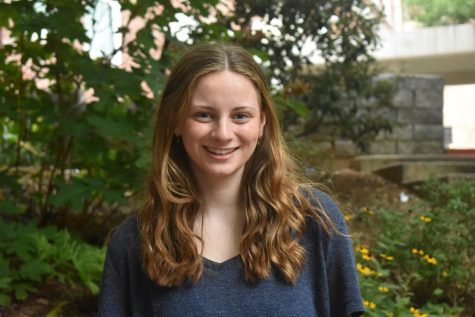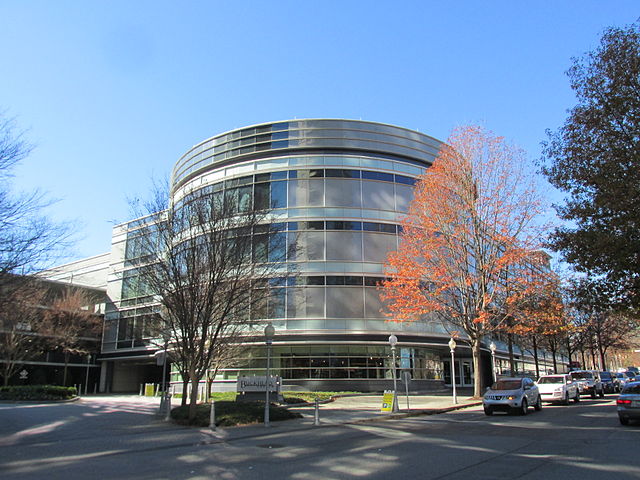Buckhead citizens are currently pushing for the deannexation of their neighborhood from the City of Atlanta.
Head to Head: Should Buckhead become its own city?
December 10, 2021
Southerner staff members Katie Sigal and Aran Sonnad-Joshi weigh-in on if Buckhead becoming its own city could potentially harm or help the city of Atlanta.
Buckhead becoming its own city, better for everyone
Buckhead was annexed into Atlanta by Mayor William B. Hartsfield in 1952. Now, many Buckhead residents believe this decision should be reversed. The Buckhead City Committee (BCC) is a group of residents pushing for Buckhead to leave the City of Atlanta.
With this separation, Buckhead would be able to address situations head-on that the City of Atlanta hasn’t helped, the group has said. The BCC cites many current problems that need to be addressed, such as zoning issues, infrastructure and crime.
From 2019 to 2020, homicide in Atlanta rose by 62 percent, and as of June, Atlanta’s police force is 400 officers under the authorized level. The City of Atlanta has yet to address these problems for over a year. Becoming its own city will allow Buckhead to form its own safety system and police force that is specific to the area.
Having a smaller localized government will help make residents’ voices feel more heard. The population of Buckhead shares a wide range of things in common, such as political opinions. This is different from the rest of Atlanta, where people across the city have differing opinions. Most of Buckhead has cohesive opinions when it comes to politics. For example, according to the New York Times, a residential area in Buckhead, Tuxedo Park, tends to vote 59 percent Republican. In comparison to a neighborhood in inner-Atlanta, Inman Park, where only 11 percent are voting for Republican candidates. Having a separate government would allow Buckhead to cater laws and policies specific to their residents.
One of the main concerns of those who oppose Buckhead cityhood is that the City of Atlanta will be losing a chunk of its tax dollars. Buckhead accounts for 40 percent of the City of Atlanta’s tax revenue. But losing these tax dollars also means losing responsibility for a big portion of the city, theoretically, not affecting tax revenue at all since those tax dollars should have been going back to Buckhead in the first place.
Many Buckhead residents don’t feel like their tax dollars are being invested in their community. The BCC proposals would make sure that the tax money is truly being used in the community and for the concerns of residents.
Many Buckhead residents also support de-annexation. A poll by the Atlanta Journal-Constitution and the University of Georgia School of Public and International Affairs found that nearly 54 perception of respondents from Buckhead zip codes strongly or somewhat support secession.
There are still many requirements the proposal has to meet, but in the end, it will be worth it. Reports from the AJC show that the majority of Buckhead supports autonomy. Buckhead residents are the people who would be affected by their decision and most of them support it. Succession opens up room for growth and allows residents to have control over how their government is run.

Katie Sigal is a senior and Comment Managing Editor and Social Media Editor for the Southerner. She is on the swim team and, in her free time, she likes...
Buckhead de-annexation selfish, harms Atlanta and schools
In every mayoral debate, one topic that has come up repeatedly is the discussion surrounding potential Buckhead de-annexation. De-annexation would result in Buckhead, Atlanta’s wealthiest neighborhood, leaving and forming its own city. However, this would harm the City of Atlanta and create logistical issues for both Buckhead and Atlanta.
First, Buckhead would deprive the city of a significant portion of its tax base. A study from Atlanta-based real estate consultants KB Advisory Group estimated that Atlanta would lose between $80 million and $116 million. While this would benefit Buckhead, less well-off areas of Atlanta that are more dependent on services and money from the city would be harmed by the loss of revenue.
Atlanta Public Schools, which currently services Buckhead through the North Atlanta cluster, could be hurt even more. The Georgia Constitution prevents local governments from creating their own school district. Buckhead students would have to attend Fulton County Schools if the city does not establish an agreement with APS. The separation could cause APS to lose $232 million, which would primarily come from lost property tax revenue. While wealthier Buckhead residents, who often send their children to private schools, would not be severely affected, the loss of revenue would take funding away from other APS schools, which need more resources than the North Atlanta cluster.
Additionally, separation would create logistical difficulties for APS, which would retain its properties in Buckhead despite them no longer being located in Atlanta. If secession occurs, students living in Buckhead would have to attend a Fulton County school. But students in the North Atlanta cluster who do not live in Buckhead would have to relocate to another APS cluster. This could lead to a ripple effect of redistricting that would affect the entire district. It would also place the staff of each North Atlanta Cluster school in a state of uncertainty, and it might not be possible for all of them to retain jobs in APS.
The separation of Buckhead, a predominantly white neighborhood, seems to be a form of white flight, a phenomenon that occurs when white people leave diverse areas. Atlanta has a long history of white flight. By leaving the City of Atlanta and attempting to place its own interest over Atlanta’s as a whole, Buckhead de-annexation represents a continuation of this trend, a modern form of segregation that places the interests of some over others.
However, Buckhead may not even get a significant benefit out of the move. The main goal of de-annexation is to create a police force to tackle rising crime in Buckhead, a symptom of a citywide increase in crime. There is no evidence that increasing the police force, a reactive solution, will actually decrease crime in Buckhead. According to the Atlanta Police Department, Zone 2, which includes Buckhead, already has the least overall crime though it does have an increased homicide rate. Instead, Atlanta must address the issues that cause people to turn to crime, something that would be much easier with the tax money from Buckhead.

Aran Sonnad-Joshi is a senior and a Co-Editor in Chief of The Southerner. This is his third year on the Southerner staff. He is also a member of the Lincoln-Douglas...
